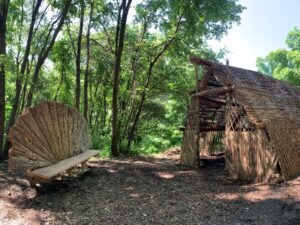
On Thursday evening, June 24 at 7:00 p.m., the Schuylkill Center invites you to a historic event. We are unveiling Al Mudhif – A Confluence, a very special installation in our forest. For more than 5,000 years, Iraqi inhabitants of the lower Mesopotamian valley, the cradle of civilization, have been building guesthouses– mudhifs in Arabic– out of reed grasses. Incredibly, this will be the very first time a mudhif (pronounced “mood-eef”) has ever been built outside of Iraq. Ever.
And it is in Roxborough.
The event is also a confluence of firsts: the opening of the first-ever mudhif is also the very first in-person public program the Schuylkill Center has offered since March 2020. We’re graduating from Zoom for the summer and going back to live programming.
Conceived and created by Iraqi designer, immigrant, and Mt. Airy resident Yaroub Al-Obaidi along with environmental artist Sarah Kavage, the mudhif is constructed entirely of the wetland grass phragmites. Our staff and volunteers harvested the “phrag,” as we have been calling it, from our own site, plus the Upper Roxborough Reservoir Preserve and the John Heinz National Wildlife Refuge (and the reservoir harvest involved volunteers from the Roxborough-Manayunk Conservancy– thanks to them).
A Eurasian plant native to Iraq, the reed is highly invasive in our watershed and throughout the country, compromising native plants and animals. Because phragmites overwhelms native ecosystems, it is not welcome at places like the reservoir and the Schuylkill Center. Yet Kavage hopes to invite a different conversation about our notion of invasiveness by using the plant productively. “There is a certain language and a method that gets applied when we’re dealing with these plants,” she says, “that is similar to demonizing immigrants and anything that is sort of out-of-place in our culture. I would love for this work to provoke a more nuanced understanding of that language around displacement and the movement of plants and people.”
As someone who has pulled thousands of invasive plants out of natural sites over the last 40 years, cursing them much of the time, I so appreciate this perspective. For me, seeing phragmites being put to good use on our property is a wonderful thing.
Built over the last month by Al-Obaidi, Kavage, center staff, and many volunteers, the group has included both Iraqi immigrants and veterans of the wars in Afghanistan and Iraq, purposefully using the construction process to heal from the twin traumas of war and displacement. Other programming this summer and fall will continue to focus on using the guesthouse as a place of healing.
In talking with Al-Obaidi, I learned that a mudhif is where special community events like weddings and birthday celebrations occur, but also where conflicting parties go to discuss and resolve differences. Special coffee ceremonies are held there as well, often hosted by the local sheikh, the tribal leader or elder. The interior of the mudhif is covered in rugs– Persian rugs, of course– and guests recline on pillows. Al-Obaidi looks forward to hosting such ceremonies during the run of the installation (wait, does that make me the sheikh? I am certainly among the oldest on staff!)
The mudhif is part of a watershed-wide series of art installations, “Water Spirit,” by Kavage, a Seattle-based environmental artist. She is constructing large– and beautiful– benches out of phragmites, again turning the invasive grass into something both aesthetic and useful. Near the entrance to the mudhif, look for one of these benches, versions of which are on display at many sites across the region, including Bartarm’s Garden, Heinz, even the Pocono Environmental Education Center way up on the Delaware River. Each bench is uniquely constructed to respond to its site.
Both the mudhif and the Water Spirit are part of a watershed-wide arts initiative organized through the Alliance of Watershed Education of the Delaware River, a coalition of 23 environmental education centers across the region focused on bringing people to our waterways, connecting them to our rivers, and teaching about the importance of water. As the group within the coalition with the most ambitious environmental art program, I’m thrilled to say the Schuylkill Center has been a leader in this project, our Director of Environmental Art Tina Plokarz serving as chair of the working group from the centers managing the installation of Water Spirits across the region. (A second art project will be unveiled shortly, by the way. Stay tuned!)
Our June 24 opening celebration includes storytelling by Native American performer Tchin, a participatory art project, and Middle Eastern dance music presented by Rana Ransom. It begins with a land acknowledgement by Trinity Norwood and Reverend John Norwood of the Nanticoke Lenni-Lenape Tribal Nation, remarks by Al-Obaidi and Kavage, and a blessing by Chaplain Christopher Antal of the U.S. Department of Veterans Affairs.
In addition, an indoor gallery exhibition accompanies Al-Mudhif – A Confluence, featuring a diverse array of voices– Native American, Iraqi, American– reflecting on the themes of belonging and sanctuary. The gallery show will open the same evening, and run throughout the summer.
So come to the Schuylkill Center on Thursday the 24th to see a true Roxborough first, the first reed-grass mudhif guesthouse built outside of Iraq in 5,000 years.
In Roxborough. Remarkable.
By Mike Weilbacher, Executive Director
Mike Weilbacher directs the Schuylkill Centre for Environmental Education in Upper Roxborough, tweets @SCEEMike, and can be reached at [email protected]
